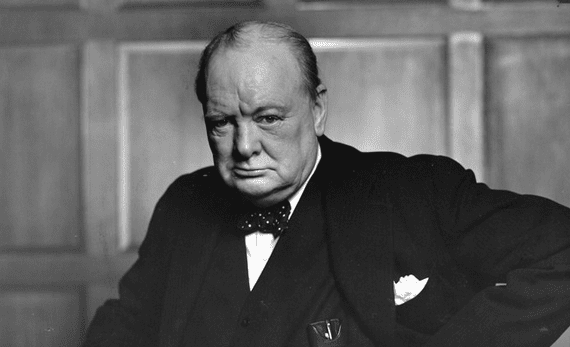This essay won 1st Place in our 2015 Essay Contest and was written by Jake McCann, a high school student in Scottsdale, AZ, USA.
Winston Churchill was one of the most influential and inspiring figures of the 20th century. He served twice as First Lord of the Admiralty for the United Kingdom and twice as Prime Minister. Churchill was charismatic. This characteristic helped him convince American President Franklin Delano Roosevelt to focus on ending the war in Europe before concentrating on the war effort against Japan. Churchill then rallied the Allied Powers to defeat Nazi Germany. In addition to combating some of the most evil forces in history, Churchill also fought bipolar disorder.
Though Churchill was never officially diagnosed with bipolar, he had many of the symptoms and behavioral issues common in the disorder. Churchill struggled with bipolar-like symptoms starting at a young age. His episodes were usually intense and prolonged. Sometimes these intense periods were caused by exterior events, such as his dismissal from the Admiralty. Other times his struggles came from within. He was aware that his depression was a medical condition and often referred to it as “The Black Dog.”
Some of his behavioral issues and characteristics included belligerence, grandiosity and abnormal energy. He would often wake up at 8:00 a.m. and work until 4:30 a.m. Churchill’s belligerence and grandiosity had the strongest impact towards his relationships with other people. One of the behaviors exhibited as a result of his belligerence was his ranting. These monologues would sometimes last up to four hours long. At times Churchill would act combative towards others. His disdain towards other people’s opinions and unwavering belief in himself as a great man were both characteristics of his grandiosity. Although at times this may have held him back, his confidence was a favorable attribute.
One way Churchill was able to deal with his depression was having close relationships with his colleagues. Two men were instrumental in Churchill’s rise to power: Brendan Bracken and Lord Beaverbrook. After he came into office, both men remained in close relations with Churchill. Having them by his side proved to be crucial to Churchill’s success as Prime Minister and a world leader. Having friends who you can rely upon goes a long way for people who have bipolar.
Another way Churchill was able to deal with his depression was through writing. During his lifetime, Churchill wrote over 15 tons of letters, articles and books. Writing was an essential way for Churchill to channel his feelings, manic depression and anxiety in a healthy way.
Churchill’s accomplishments inspire me to live a full life and provide helpful lessons for people with bipolar disorder today. One lesson is: talk things through with a friend. Another valuable lesson is: have a positive way of channeling your emotions, whether it’s journaling your thoughts, or writing an angry letter to someone who’s troubled you and then throwing it away. The most important lesson is: you can do whatever you want in life, and if you set your mind to it you can accomplish your dreams.
Bibliography:
http://www.bbc.com/news/magazine-15033046
http://www2.nami.org/Content/NavigationMenu/Not_Alone/Winston_Churchill.htm
http://www.bipolar-lives.com/winston-churchill-and-manic-depression.html


